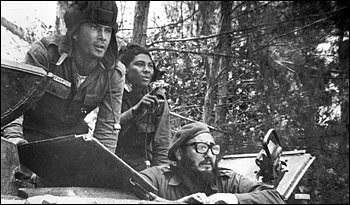
|  |  |  Editorials | Issues Editorials | Issues  
At 50, Cuban Trade Embargo is Not Aging Well
 Al Kamen - Washington Post Al Kamen - Washington Post
go to original
August 06, 2010


| | Fidel Castro got a tank's-eye view of the Bay of Pigs invasion in 1961. The U.S. trade embargo, then in its infancy, could not oust him. (Raul Corrales/Associated Press) |  |
The half-century-old Cuban trade embargo has seen better days. For its first 30 years, when the Castro crowd was in cahoots with the Soviets - even welcomed nukes 90 miles from Florida - the embargo enjoyed widespread support.

The collapse of the Soviet Union 20 years ago undermined the Cold War rationale for the effort. International and domestic support steadily eroded. Even Bay of Pigs veteran Francisco J. Hernandez, head of the hard-line Cuban American National Foundation, last year undercut the once-sacred embargo, not calling for ending it but calling it "a symbol'' and "not something that is that important anymore."

But you're in very deep trouble when none other than Soldier of Fortune magazine blasts the embargo in an article headlined "Fifty Years of Failure: Petrified U.S. Policy Toward Cuba."

Worse, the lead author of the piece, coming out in the October issue, is Jay Mallin, a former Latin America reporter for the Washington Times and news director of Radio Marti during the Reagan administration. (His co-author is former Miami Herald Latin America editor Don Bohning, who covered Cuba and the region for many years.)

The embargo "is essentially an absurdity that accomplishes nothing," they write, and "has been a boon to the Castro government, providing a handy excuse" for its failures. They recount arguments, usually spouted by the libs, for changing course.

On the international front, the United Nations has regularly condemned the embargo. Last year's cliff-hanger vote was 187 to 3 - the United States, Israel and Palau (although key allies Micronesia and the Marshall Islands abstained). The Organization of American States, which kicked Cuba out in 1962, invited the Cubans back in, they note. Cuba declined.

The authors include a list of lesser-publicized matters. For example, "U.S. appliances and such are sold to Cuba by other trading nations, such as Panama."

And it's not as if the two governments aren't cooperating on a number of matters, Mallin and Bohning write, including immigration and the Navy base at Guantanamo. After the BP oil disaster, "U.S. and Cuban officials conferred on the potential oil threat to Cuba." In addition, "U.S. and Cuban coast guards coordinate on anti-drug operations" and "military personnel recently held joint maneuvers in an anti-drug exercise. Helicopters from the two sides flew over each other's jurisdictions."

The Castro regime is already crumbling, the authors say, so "logic indicates that the U.S. should be dealing openly with Cuba, moving into a position which might enable it to influence events, helping it get back on the road to democracy." Not to mention keeping the island from becoming an 800-mile landing strip for the drug cartels.

In recent years, agriculture and business groups have been increasingly opposed. A business group from Virginia went there recently. (And look for Obama administration action, after Congress leaves town, to loosen travel restrictions.)

Still, we have always counseled patience. It is virtually guaranteed that the embargo, if given another 10 years, will see the Castro brothers - Fidel is 84, Raul is 79 - gone from power. |

 |
|  |



